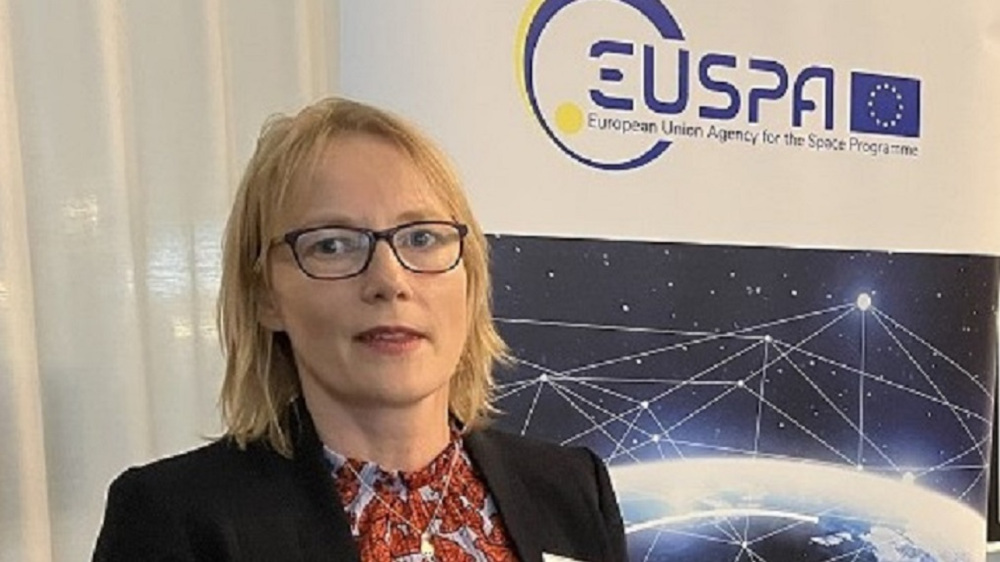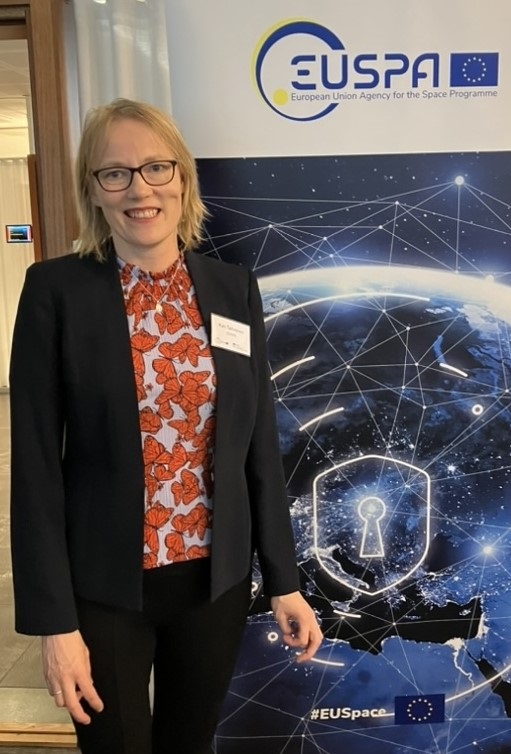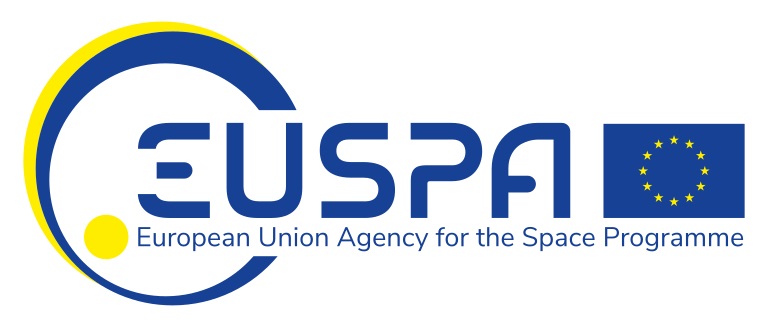
From a geomatic student to an expert in the space agency
Kati Tahvonen applied for work at the European Union Agency for the Space Programme (EUSPA) in Prague in spring 2022. Now she tells us what it is like to work there and encourages Finns to apply for work in the EU, because Finns are under-represented there.
Tell us about your background and interest in space issues
I became interested in space when I started flying at the age of 17. I didn't really know what I was going to study. Because I had studied physics and natural sciences in high school, I applied to Aalto University, or the then University of Technology, where I ended up as a land surveyor, or student of geomics, majoring in remote sensing. I wrote a Master's thesis on the problems related to the observation of oil fasts by satellite.
At the beginning of my career, I carried out remote sensing of field and agricultural support as summer jobs and later ended up working with remote sensing at the Finnish Environment Institute. I learned to utilise space data in monitoring the state of the Baltic Sea and land use monitoring.
I have worked in different positions in Finland and abroad, for example in the United Nations Environment Programme (UNEP), the Border Guard, the European Maritime Safety Agency (EMSA) and now the European Union Agency for the Space Programme EUSPA. I have alternated in international and national tasks, which has sometimes seemed like a funny jump. However, I feel that regular exchange of views is valuable, as international organisations sometimes need national level understanding and vice versa.
What kind was the interview process for EUSPA and what kind of expertise is needed there?
The process involved several stages. However, applications for the benefit are made directly to the posts advertised. Thus, all stages of the process are also related to future work tasks.
The first phase was an automated video interview, where answers to questions related to one's own work experience had to be recorded. After the traditional remote interview that followed, an interview with the Director General and middle management was still completed. The final result came in a week.
There seems to be strong demand for engineers in Europe, also at the EU level, especially if the applicant has space background and expertise. There is also strong demand for cyber security expertise. The greatest need is for technical experts. There is, of course, also a great deal of treaties in the EU, which means that lawyers and financial experts are needed. There is also demand for various project, process and quality experts. EUSPA opens quite a lot of traineeships every year. Finnish employees are under-represented in the EU in general and also in EUSPA.
Tell about your tasks
My official title is Copernicus Innovation and Market Officer. As I have experience both at national and international level and also in the public sector, I also have a lot of interaction with individual Member States.
The tasks of our department are related to promoting the use of space data and developing European space business. The aim is to make our activities and European satellite data known to groups of users who do not necessarily even know that space could help solve their challenges. For example, smart watches and the health sector could use even more space-related data.
What have you liked most about your work?
That the work is truly diverse. It is also nice that colleagues include experts from many fields from different backgrounds.
How is the work of EUSPA visible in concrete terms, for example, in Finland's space activities or in citizens' everyday lives?
For example, everyone has Galileo on their mobile phone. It may also be a challenge and opportunity – we want space to become a daily life for everyone. The end user may not even know that he or she has a European positioning system on the phone. It is challenging to get end-users of services to innovate how services could be utilised more, as there may not be information on which services space already produces – or could produce.
Which cooperation networks does EUSPA belong to and what kind of cooperation does it usually comprise?
EUSPA is an organisation operating under the European Commission's Directorate-General for Defence Industry and Space. Under the guidance of the Commission, we cooperate with many actors, i.e. key space actors (e.g. ESA). When we think about how to take start-ups forward, it has its own cooperation patterns; for example, contacts with investors and business angels have been created. There is also cooperation with investment banks to raise the profile of the entire space industry in Europe. After all, each involves cooperation networks in its own sector. For example, colleagues who work more with environmental issues or climate change create their own cooperation networks. Without that work, I'm sure you wouldn't be able to do it.
If someone were interested in applying for a job at EUSPA, what kind of lift speech would you like to use? Three reasons?
The space sector is growing at a terrible rate right now. There are many interesting openings in this area, and EUSPA is a vantage point for what is happening in this area. You can also influence matters. Working in an international working environment is rewarding and challenging in a good way – you have to and get to challenge your own thinking about how things should, in your own opinion or in others' opinion, have and sometimes find interesting observations about your own thinking.
Pay and other benefits are fairly good, especially if you move with your family. EU pays the costs of early education centres and international schools, which is a great advantage. Migration costs will also be supported.
Do you often visit Finland yourself?
To varying degrees. During the year, I have been on a business trip to Finland three times. In addition to these, I have been three to four times, roughly every other month. Prague has good and fast connections to Finland, so weekend trips are also possible.
What kind of encouragement do you give to people who are considering applying for EUSPA? Is the threshold for applying considered too high in Finland?
If you have an interesting job, be bold – few applicants meet all the criteria. You should read the application text carefully and respond systematically to the application criteria presented in it – using the same terminology. It is advisable to prepare the application carefully and respond to each item that is required. There are quite a lot of applicants, and in the early stages of the process, the applications are read carefully against the criteria.
This was my third or fourth call for applications for this kind of EU post, and now it snapped. It was very useful that I already had old experiences of application processes, writing an application and interviewing. I think the recruiter will probably see if you've been training to apply. In other words, all you have to do is practise applying for EU jobs.
What is it like to live in Prague?
This is a small European capital, especially in the good sense. Public transport functions very well, things are accessible and close, unlike in many larger cities. There is a lot of cultural and musical content here. Prague has a long history, and from outside the interesting historical centre you can enter the natural environment immediately. There is no impossible congestion, which means that you can easily organise the time of your life smoothly.
What kind of Czech bureaucracy was there and will some EUSPA body help?
Most of the bureaucracy is related to working in the EU. A lot of paperwork must be done when you come here, but EUSPA helps with local authorities. I have not had to visit the agencies at all, and that is quite a big deal. A lot is done through EUSPA, and I think the whole process is smooth. And when I have moved already many times, it will, of course, always be easier. I did not see it turning into a problem myself; the address is just a little further away, we do a couple of weeks sweaty paperwork, and then we already live abroad. It's not that much.
EUSPA – European Union Agency for the Space Programme The European Union Agency for the Space Programme (EUSPA) provides secure and protected European satellite navigation services, promotes the commercialisation of Galileo, EGNOS and Copernicus data and services, coordinates the EU's governmental GOVSATCOM satellite communication programme and is responsible for the service points for the supervision and monitoring of space objects in the programme. EUSPA is responsible for the approval of the security arrangement for all components of the EU Space Programme. EUSPA promotes the development of an innovative and competitive space sector and cooperates with the entire EU space community. In doing so, it contributes to the European Green Deal and the digital transition as well as to the security of the Union and its citizens, while strengthening the Union's autonomy and resilience. Experts from 24 EU countries work in EUSPA.
|






